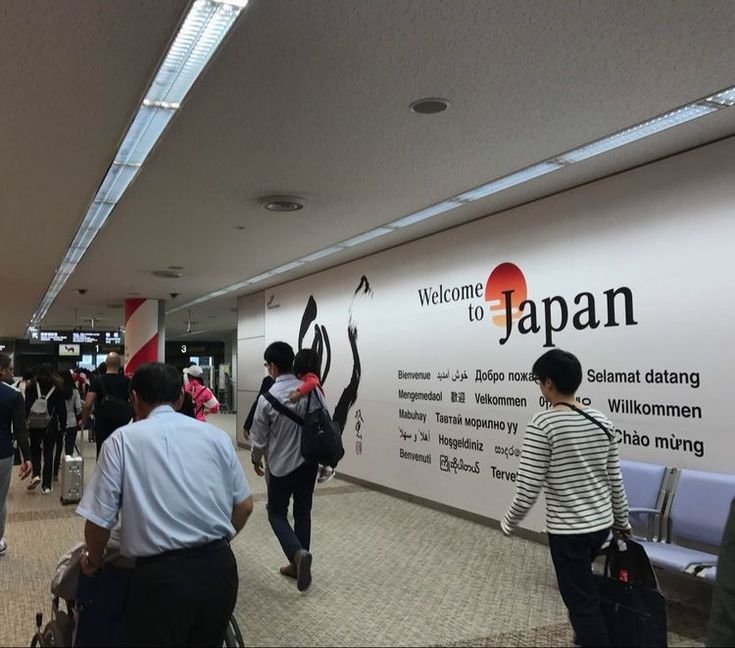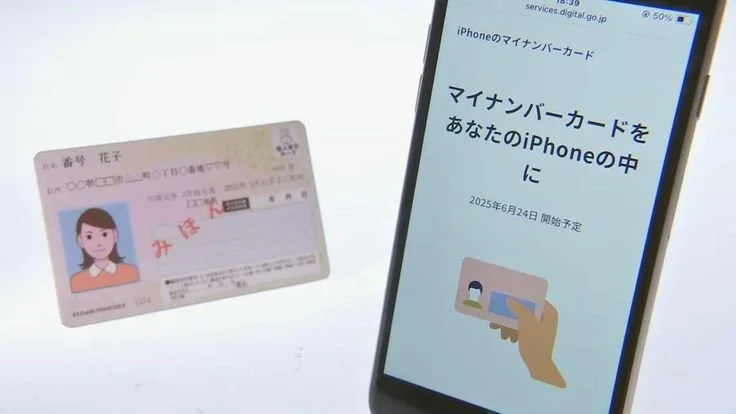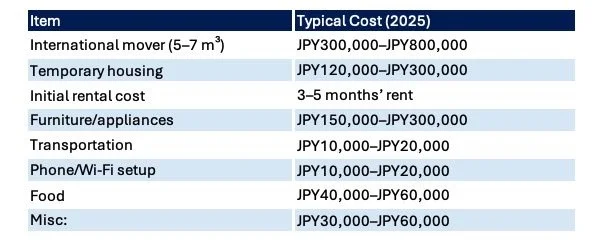How Long Does It Really Take to Move to Japan? Timeline from Job Offer to Landing
Planning to move to Japan for work? Relocating to Japan is exciting, but it can quickly feel like a full-time job when you’re juggling visas, housing, movers, pets, and endless paperwork.
This guide breaks down the real relocation timeline—from job offer to landing—so you know exactly what to expect. Whether you're relocating alone or with your family, here’s the step-by-step process that most people wish they had known before moving to Japan.
This blog covers:
1. The Overall Timeline: Planning Is the Key
2. Pets: Start 7 Months Before for Safety
3. Visa + COE Deep Dive
4. Selling/Renting Your Place: Sorting Your Stuff Early
5. International Movers: Ocean vs. Air vs. Airline Suitcases
6. Must-Do Tasks in Your Home Country
7. Flight Booking & Airport Arrival: Getting Your Residence Card
8. Temporary Housing: Hotel or Short-Term Furnished Apartment?
9. Renting a Place: What Foreigners Should Know
10. City Hall, Bank, Phone, My Number
11. Day 1 at Work & Insurance
12. Cost Summary Table
13. Family/Kids note
14. Stress Management & Community
15. Q&A
16. Wrap up
1. The Overall Timeline: Planning Is the Key
Most relocations to Japan take 3–5 months from job offer to arrival. The speed depends on:
Your employer’s readiness (especially for the Certificate of Eligibility)
Your nationality (U.S. is usually fast)
Your documents (degree, passport renewal, marriage certificates)
Whether you have pets
Whether you’re relocating alone or with a family
Whether you sell or rent out your current home, or simply end your lease
A typical timeline looks like this(Assuming an Engineer/Humanities/International Services visa):
Job Offer → contract negotiations (1–2 weeks). Check whether your employer provides any global relocation support.
Certificate of Eligibility (COE) issuance and immigration review → 4–12 weeks
Visa application at consulate → 3days-4 weeks depending on region/location
Move preparation → 4–6 weeks
Departure → flight + entry
Landing in Japan → receive Residence Card at a major airport
Temporary housing → 1–4 weeks
Permanent housing search → 2–6 weeks
Start working → onboarding, insurance, pension registration
The key message: Japan moves fast in some areas and very slowly in others. Planning prevents last-minute panic.
2. Pets: Start 7 Months Before for Safety
Japan has one of the strictest pet import systems in the world.
If you have a dog or cat, prepare for:
Microchip
Two rabies vaccinations
Rabies antibody test (FAVN)
180-day waiting period
Advance notification to Japan’s Animal Quarantine Service
Pet travel carriers + water bottle
Flight availability (not all airlines allow pets)
Customs clearance on arrival (1–3 hours)
NOTE: There is a fast-track option—pets coming from the U.S. can sometimes enter Japan with only a 40–50 day waiting period, but this is only possible if all paperwork, timing, and vaccinations are completed flawlessly. Check with your vet or Japan’s Animal Quarantine Service before making plans.
See more detail: Moving to Japan with a Dog: Jager’s Journey from Chicago
3. Visa + COE Deep Dive
The visa process is mostly paperwork, but timing matters.
Step 1: COE (Certificate of Eligibility)
Your employer applies for it. You cannot apply by yourself.
Typical COE timeline: 4–12 weeks
Delays usually happen because:
Your degree documents are incomplete
Employer submits incorrect job description
Immigration requests additional documents
Company has little experience hiring foreigners. Big firms typically hire immigration service providers.
Immigration workloads spike in March/April (new graduates & expats), so processing can take longer.
Step 2: Visa Application at the Consulate
Once you receive the COE (paper or PDF), you must apply for your work visa at a Japanese consulate in the country where you legally reside. You cannot apply inside Japan.
Typical Processing Time
Los Angeles, New York, Chicago: 2–4 weeks
Portland, Anchorage: Often still same-week or walk-in
Others vary depending on staffing and seasonal volume.
Always check the specific consulate’s website, as requirements and timelines differ.
Required Documents
Bring the following to your visa appointment or submission:
Passport
Visa application form
Passport-style photo
Certificate of Eligibility (COE) — either the original or PDF, depending on consulate rules
Any additional documents requested by that consulate (employment contract, itinerary, etc.)
Note: Applying for a Japanese work visa in a third country is sometimes possible, but never guaranteed. Always confirm with the consulate beforehand to avoid delays.
4. Selling/Renting Your Place: Sorting Your Stuff Early
This is the most emotional and time-consuming part. Most people underestimate it.
Make decisions in three categories:
Bring – do you really need it? If not, consider leaving it behind in a storage unit.
Give/Sell – Offer items to family, friends, colleagues, or neighbors. Try garage sales, local marketplaces, or charities. (We ended up using all of these options.)
Throw Away
Japan has smaller apartments, different electrical voltage, and strict waste rules. Consider:
U.S. large furniture will not fit
Kitchen appliances may not work (or will be inefficient)
Shoes, clothing, and bedding sizes differ
Electronics should be dual-voltage if you bring them
For homeowners:
Renting your home can cover relocation costs, but maintenance can be headache
Selling takes time—start early, and have a backup plan in case it doesn’t sell before your move. Buyer visits, inspections and closing process can also be quite stressful.
Notify your mortgage lender and insurance providers as soon as your plans are confirmed.
For renters: Check the notice period required in your lease so you can time your move correctly.
5. International Movers: Ocean vs. Air vs. Airline Suitcases
Most foreigners moving to Japan use a mix of air shipment (fast, expensive), ocean shipment (slow, cheaper) and airline suitcases (items you need right away).
Typical timelines:
Air shipment: 7–14 days
Ocean shipment: 6–10 weeks (depending heavily on your departure country)
your checked luggage that you bring on the plane
Many expats buy most of their furniture after arriving instead of shipping large items from home.
Tip: Japan’s delivery companies—Yamato (Black Cat), Sagawa, and Nippon Express (Nittsu)—are reliable and relatively inexpensive. Once you settle, you can ship most of your household items domestically without much hassle.
6. Must-Do Tasks in Your Home Country
(Especially for U.S. Citizens & Green Card Holders Living in Japan)
Do these while you’re physically in the U.S. – you’ll save months of headaches and thousands of dollars later.
a.Secure a Permanent U.S. Address - Almost all U.S. banks, brokerages, IRS, and credit bureaus now require a real U.S. street address (not a Japanese one).Best services used by Japan-based Americans:
Traveling Mailbox – most popular among expats
Anytime Mailbox – cheapest (USD10–20/mo)
iPostal1 – 2,000+ real street addresses
Earth Class Mail – premium, perfect for legal documents
2025 Tip: Schwab, Fidelity, and Vanguard reject most CMRA (PMB) addresses. Choose a provider that gives you a real street address (no “PMB” or “#” in the address line).
b. Keep a Working U.S. Phone Number (Under USD15/mo) - Needed for banking 2FA(Two-Factor Authentication), credit monitoring, IRS, Social Security and so forth.
Best plans in 2025:
Mint Mobile – $15/mo unlimited talk & text (works on Wi-Fi in Japan + full service when you land)
US Mobile – $8–10/mo light plans (perfect if you only need SMS)
T-Mobile Connect prepaid – $15/mo
Google Voice – free, but many banks stopped accepting VOIP numbers for 2FA in 2024–2025
c. U.S. Tax & Retirement Tasks
Hand-deliver documents to your CPA
Contribute to IRA/Roth IRA (many brokers block contributions from Japanese IP)
File FBAR (FinCEN 114) & Form 8938 if assets > threshold
File Form 8833 if you are claiming treaty benefits with FEIE
d. Renew Critical Documents (Only Possible in the U.S.)
Driver’s license (many states now issue 10–12 year validity) -> In Japan, you must convert your license before your home-country license expires.
Global Entry / SENTRI renewal interview (now mostly “Enrollment on Arrival only)
e. Banking & Credit
Visit physical branches (Schwab, Chase, Bank of America) – many restrictions can only be lifted in person
Order replacement debit/credit cards to your new U.S. address
Apply for new credit cards while you have a U.S. address and are physically present (approval rates 3–5× higher)
f. Social Security & Medicare (Age 65+)
Apply/enroll in Medicare Part B (must be done in the U.S. during your Initial/General Enrollment Period)
Replace or update SSN card
7. Flight Booking & Airport Arrival: Getting Your Residence Card
After receiving the visa, book your flight.
Upon landing at Narita, Haneda, Kansai, or Chubu:
Present passport + visa
Immigration reviews your COE
You receive your Residence Card (在留カード) on the spot
If you are traveling with a pet, confirm the airport procedures in advance and follow the Animal Quarantine Service instructions upon arrival.This is a major milestone! Your life in Japan officially starts here.
After arrival:
If you land at a small regional airport (Fukuoka, Hiroshima, Sendai, New Chitose, etc.) you now get only a “Landing Permission” sticker You must go to city hall within 14 days to pick up the actual plastic Residence Card.
If you fail to register your address within 14 days of deciding your place of residence, you may be fined up to JP Y200,000. In addition, if you do not register your address within 90 days of entering Japan without a valid reason, your residence status may be revoked.
8. Temporary Housing: Hotel or Short-Term Furnished Apartment?
Most newcomers stay in temporary housing for 1–4 weeks. Some employers (especially larger companies) may secure temporary housing on your behalf.
Options include:
Hotels (convenient but expensive)
Serviced apartments (popular with corporate relocations)
Monthly/weekly furnished apartments (Reasonable price, common in Tokyo/Osaka)
MAN3’S (Site in Japanese, but you can search available room for foreigners)
When choosing temporary housing:
Near your future office?
Easy train access?
Pet-friendly?
Close to supermarkets or convenience stores?
Tip:
Even if your final apartment is not ready, arriving with temporary housing reduces stress and lets you start viewing properties immediately. Some companies (especially in Tokyo) secure a lease for you and you just move in Day 1.
9. Renting a Place: What Foreigners Should Know
Japan’s rental market is competitive, rule-heavy, and often requires in-person procedures. However, the good news is that many real estate agents today are foreigner-friendly, especially in major cities like Tokyo, Yokohama, Osaka, and Fukuoka.
Before Arriving: Start House Hunting From Your Home Country
Even before you land in Japan, you can begin researching neighborhoods, train lines, commuting routes, room types, and approximate rent ranges. This will help you set realistic expectations and communicate more clearly with your future agent.
Browse listings on these foreigner-friendly sites:
Best-Estate Japan (English) - Tokyo-focused rental listings
Save 5–10 properties that fit your needs and send them to your real estate agent before arriving. They will check availability (Many online listings are placeholders—availability often changes daily.) and prepare alternatives.
What to expect:
Pets narrow your options significantly: Only a small percentage of properties allow pets, and pet-friendly units often require extra deposit.
Upfront costs are high: Expect to pay 3–5 months’ rent upfront, including:
o Deposit (shikikin)
o Key money (reikin) – increasingly rare in many areas
o Agency fees
o Guarantor company fees - Many new buildings (especially share houses now accept GTN/Global Trust Networks with zero guarantor fee if your company is on their partner list.
o First month’s rent
Ask your real estate agent to show you properties that don’t require key money. A guarantor company is usually required: Even for people with stable jobs, guarantor companies (保証会社) are standard. Income verification may be required: You can show your employment contract, or Offer letter.
Apartment Tour Tips:
Time from nearby train station
Buildings labeled “mansion” are sturdy (RC/SRC) – In case of earthquake
Check for noise levels
Elevators in older buildings are small
Check convenience stores and supermarkets nearby
Make sure common areas are clean
Confirm the main entrance has proper security
Utilities:
After signing the lease, you must set up the following. Ask the real estate agents for support.
Electricity
Gas
Water
Wi-Fi
Mandatory fire insurance, which includes household property insurance, tenant liability insurance, and personal liability insurance.
NOTE: Be sure to check your local garbage rules. Every area has different sorting and pickup schedules, and they are strictly enforced.
Home appliances and furniture – Japanese rental apartments usually come completely unfurnished—no refrigerator, washing machine, microwave or furniture. Rooms often have only the ceiling hook-in socket—no actual light attached. You can rely on a coin laundry temporarily, but for essentials, popular shopping options include Nitori, IKEA, Costco, and local home goods stores.
See also: Troubleshooting Renting a Home in Japan: With Freebie Forms
10. City Hall, Bank, My Number and Phone
To start your life in Japan, you must complete these steps in order:
Step 1: Register Address - Visit city hall within 14 days of deciding your place of residence
Step 2: My Number - Your My Number card or notification will be mailed to your registered address. This is your unique identification number and is linked to important systems such as health insurance and the Japanese pension. Do NOT share your My Number with anyone unless legally required—for example, for salary payment, tax filings, or official government procedures.
Step 3: Open a Bank Account - This is harder than people expect. Requirements:
Residence Card
Address registration
Phone number
In some banks: employment certificate or hanko (seal)
Common banks that accept foreigners more smoothly:
SBI Shinsei – fully English app
Sony Bank – English support
Prestia (SMBC) – Took over retail business from Citibank in 2015
Rakuten Bank – online only, very fast
Step 4: Mobile Phone - After opening a bank account, getting a mobile phone becomes straightforward. Visit a carrier shop— ahamo / LINEMO / Rakuten Saikyo Plan – Those are much cheaper than the big company’s plan such as NTT Docomo, SoftBank or au.
11. Day 1 at Work & Insurance
Your employer will register you for:
Employer provided Health Insurance – Your coverage begins on Day 1. If your insurance card is not ready yet, you can pay upfront and get reimbursed later. Usually it takes a few days.
Welfare Pension (厚生年金)
Employment Insurance
Workers’ Compensation – The premium is 100% paid by the employer.
Check whether your employer offers a 401(k)-type retirement plan or other benefits
NOTE: Social insurance premiums are usually deducted starting the following month. Once deductions begin, make sure to check the amounts you are paying.
Bring:
Passport
Residence Card
Bank account details
My Number
Dependents’ documents if applicable
12. Cost Summary Table
If I can pack everything into the back of a pickup truck plus a small trailer → roughly 5–7 m³.
Total realistic cost for the first 2 months in Japan - JPY2–3.5 million for single person.
Real story
We used Nippon Express for our relocation, and they were extremely organized. In 2022, we shipped 60 medium boxes and 15 large boxes from Chicago to Tokyo via ocean freight. It cost approx. JPY600,000, and everything arrived in about six weeks.
13. Family/Kids note
If you are relocating with family, timing is important. Because the Japanese school year starts in April, many families choose to have the working parent move first and bring the spouse and children later, depending on the school term schedule.
Public Kindergarten and Elementary Schools
Your local city hall (市役所) can introduce public kindergarten and public schools in your district. In Japan, most children attend public elementary school, which is generally safe, affordable, and high quality.
International Schools
If you prefer English-language education or want continuity with your child’s current curriculum, you may want to explore international schools. These often have different academic calendars and may allow mid-year admission.
Middle and High School Pathways
In Japan, it’s common for families to use public elementary schools, but many students take entrance exams to enter competitive junior high schools and high schools. If your children are older, it’s worth researching these pathways early.
See also: Japanese Education System 101: A Practical Guide for Families and Students
14.Stress Management & Community
Common stress points:
Language barrier
Small living spaces
Administrative paperwork
Cultural indirectness
Noise or isolation
Lack of familiar food or community
Recommendations:
Take walks and explore your neighborhood—I mean it.
Learn a few survival Japanese phrases
Give yourself grace during the first 3 months
Explore Japanese food—ramen, sukiyaki, shabu-shabu, Takoyaki and so much more.
Stay connected with friends back home (you’re only a Zoom call away)
Join expat communities
You’re rebuilding your life from zero, and that takes courage.
15.Q&A: Quick Answers to Common Concerns
Q1: How soon after getting my visa do I need to fly?
A1:Most visas require entering Japan within 3 months of issue.
Q2: Can I rent an apartment before I arrive?
A2:Usually, no. Most landlords require you to sign the contract in person and verify your bank information. However, you can start communicating with real estate agents in advance to speed up the process once you arrive.
Q3: Can my spouse come later?
A3: Yes. They can apply for a Dependent Visa after your COE is accepted.
Q4: Can I enter Japan on a tourist visa and switch?
A4: No. This is a very common myth. You cannot work in Japan while on a tourist visa.
If you are found working in Japan on a short-term stay (tourist) visa, you may face serious penalties, including:
Forced deportation
Up to a 5-year ban on re-entering Japan
Fines or, in severe cases, imprisonment
Even if you already have an employment contract, you cannot legally start working unless your Certificate of Eligibility (COE) is issued and you have entered Japan with the proper work visa. If the COE is not approved while you are in Japan on a tourist visa, you will be required to return to your home country to apply—making “early entry” counterproductive and risky. In short, entering Japan early on a tourist visa does not speed up the process. It can actually create more problems.
Q5: Do I need Japanese language skills?
A5: I highly recommend learning Japanese. Even basic skills will make daily life easier, help you connect with people, and support your long-term success in Japan.
Q6: What if my company is slow with the COE?
A6: In many cases, the HR department asks a Japanese certified immigration specialist (行政書士) to prepare and submit the COE application. This means the timeline often depends on both HR and the immigration specialist. If either of them is slow, the entire process is delayed.
Normally, the hiring manager inside the company is also pressuring HR to complete the process, but it is still important for you to stay in regular communication with HR. Your follow-up emails work as an effective reminder and help keep the timeline moving.
If possible, agree on a target start date with your hiring manager. When the start date is clearly set, HR is more likely to push the immigration specialist to move faster and prioritize your application.
16. Wrap-Up
Relocating to Japan is not simple, but it is absolutely achievable with the right planning.
The hardest part isn’t the visa or the paperwork—it’s managing the sequence of tasks that all depend on one another. Once you understand the big picture, you can move through the entire process much more efficiently.
I hope this blog helps you navigate what can be a time-consuming—and sometimes stressful—journey.
Your experiences can help others too—share your story, tips, or questions in the comments section.










